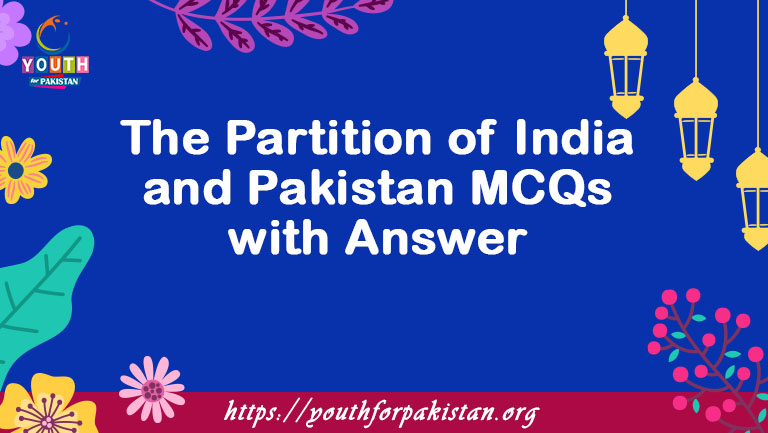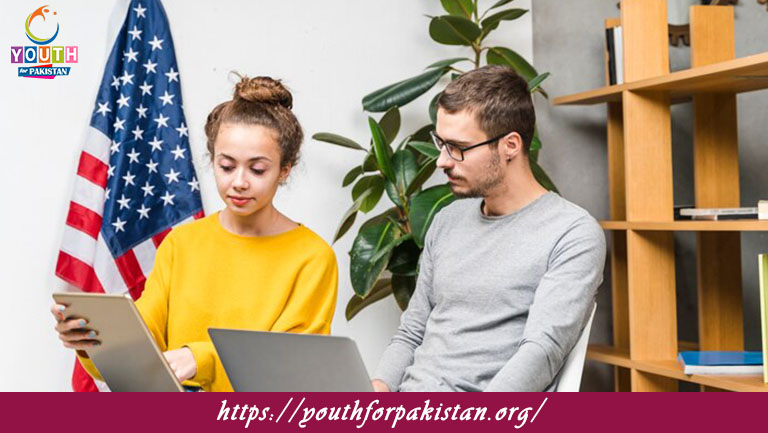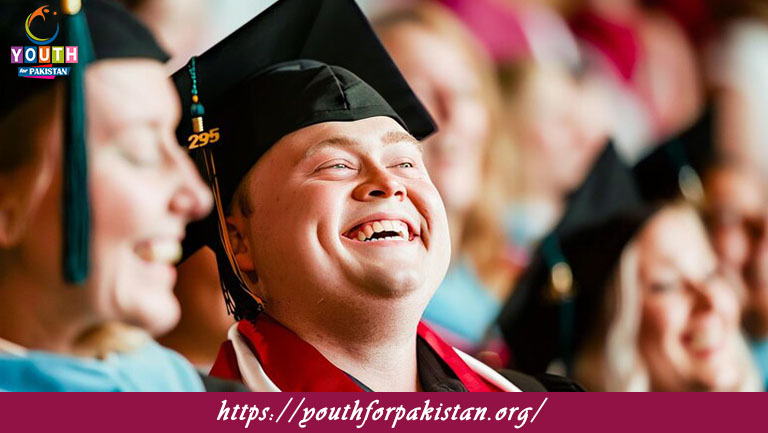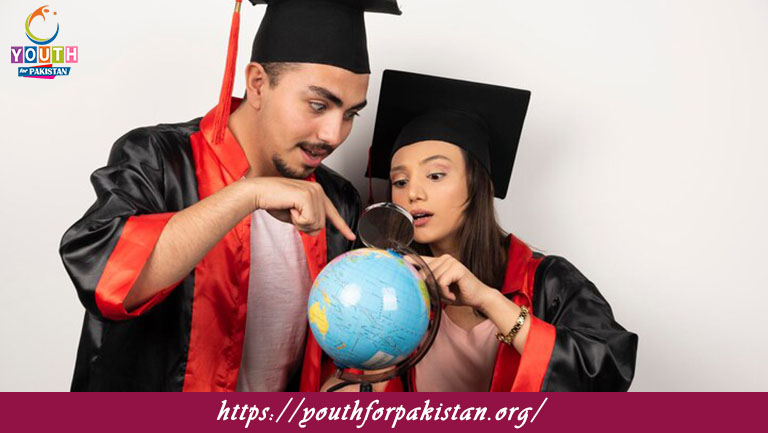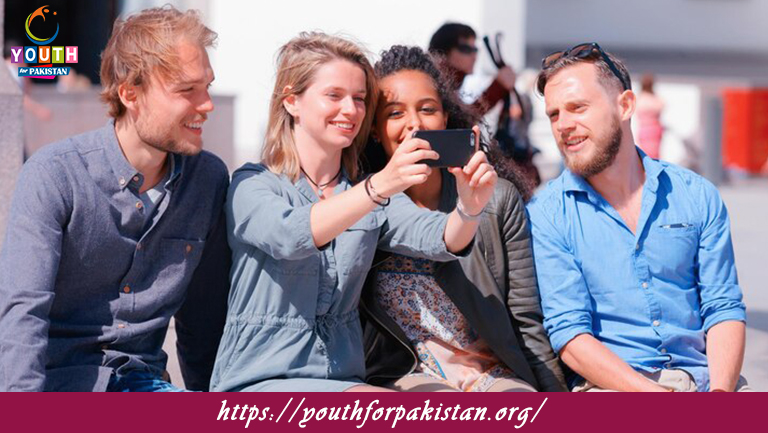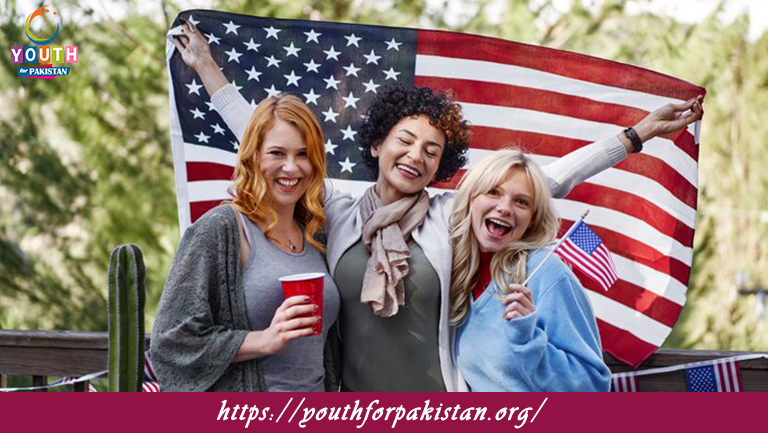The following are The Partition of India and Pakistan MCQs with answers related to Islamic Studies. We have arranged the most important and repeated MCQs in all the competitive examinations. The students can clear their concepts for The Partition of India and Pakistan MCQs online quiz by attempting these.
The Partition of India and Pakistan Online MCQs with Answers
When did the Partition of India and Pakistan occur?
A) 1942
B) 1945
C) 1947
D) 1950
Who was the last British Viceroy of India during the partition?
A) Lord Curzon
B) Lord Wavell
C) Lord Mountbatten
D) Lord Irwin
The Radcliffe Line divided which two regions during the partition?
A) Punjab and Sindh
B) Bengal and Assam
C) Punjab and Bengal
D) Sindh and Assam
Who was the leader of the Indian National Congress during the partition?
A) Jawaharlal Nehru
B) Mahatma Gandhi
C) Sardar Patel
D) Maulana Abul Kalam Azad
Which religious leader played a prominent role in the demand for Pakistan?
A) Subhas Chandra Bose
B) Allama Iqbal
C) Bhagat Singh
D) Sardar Patel
What was the main reason for the partition of India and Pakistan?
A) Religious differences
B) Economic disparities
C) Linguistic diversity
D) Political conflicts
Which Indian leader is known as the “Father of the Nation”?
A) Jawaharlal Nehru
B) Sardar Patel
C) Mahatma Gandhi
D) Subhas Chandra Bose
Which region saw the most violence and bloodshed during the partition?
A) Punjab
B) Bengal
C) Sindh
D) Gujarat
What is the name of the city that became the capital of Pakistan after the partition?
A) Dhaka
B) Karachi
C) Lahore
D) Islamabad
What is the term used for the mass migration and displacement of people during the partition?
A) Exodus
B) Diaspora
C) Migration
D) Partition
Who became the first Prime Minister of India after the partition?
A) Sardar Patel
B) Jawaharlal Nehru
C) Mahatma Gandhi
D) Subhas Chandra Bose
Which religious group demanded the creation of Pakistan?
A) Hindus
B) Sikhs
C) Muslims
D) Christians
Who was the first Governor-General of Pakistan?
A) Allama Iqbal
B) Liaquat Ali Khan
C) Muhammad Ali Jinnah
D) Iskander Mirza
What is the name of the river that forms the border between India and Pakistan in the west?
A) Brahmaputra
B) Sutlej
C) Ganges
D) Indus
Which Indian state witnessed the most significant communal riots during the partition?
A) West Bengal
B) Uttar Pradesh
C) Bihar
D) Gujarat
What was the population ratio between Hindus and Muslims in undivided India before the partition?
A) 3:1
B) 2:1
C) 1:1
D) 4:1
Which Indian leader was known as the “Iron Man of India” for his role in integrating princely states into India after the partition?
A) Jawaharlal Nehru
B) Mahatma Gandhi
C) Sardar Patel
D) Subhas Chandra Bose
What is the name of the region in the northwest that remained part of India after the partition?
A) Punjab
B) Sindh
C) Balochistan
D) Kashmir
Which country provided support to the princely state of Jammu and Kashmir during the partition?
A) India
B) Pakistan
C) United Kingdom
D) United States
What is the name of the plan that outlined the partition of India and the creation of Pakistan?
A) Lucknow Pact
B) Simla Agreement
C) Cabinet Mission Plan
D) Mountbatten Plan
Which princely state’s accession to India led to the First Kashmir War in 1947?
A) Hyderabad
B) Junagadh
C) Jammu and Kashmir
D) Manipur
What was the role of Cyril Radcliffe in the partition?
A) He was a leader of the Indian National Congress.
B) He was the last British Viceroy of India.
C) He was a prominent Muslim League leader.
D) He chaired the boundary commission that drew the Radcliffe Line.
What is the significance of the city of Amritsar in the context of the partition?
A) It was the capital of Pakistan after the partition.
B) It witnessed a major massacre of civilians during the partition.
C) It became the capital of East Pakistan (now Bangladesh).
D) It is the birthplace of Mahatma Gandhi.
What is the name of the region that became East Pakistan (now Bangladesh) after the partition?
A) Balochistan
B) Sindh
C) Bengal
D) Kashmir
Which princely state initially wanted to join Pakistan but eventually acceded to India after a referendum?
A) Hyderabad
B) Junagadh
C) Jammu and Kashmir
D) Manipur
Which Indian leader is known for his role in advocating for the rights of Dalits (untouchables) during the partition?
A) Jawaharlal Nehru
B) Bhagat Singh
C) B.R. Ambedkar
D) Sardar Patel
Which country did the princely state of Hyderabad eventually accede to after the partition?
A) India
B) Pakistan
C) United Kingdom
D) Independent status
What is the name of the region that became the modern-day state of Gujarat in India after the partition?
A) Punjab
B) Sindh
C) Balochistan
D) Bombay Presidency
What is the term used for the communal violence and killings that occurred during the partition?
A) Tragedy of Errors
B) Great Calamity
C) Jallianwala Bagh Massacre
D) Direct Action Day
Who is the author of the book “Train to Pakistan” that depicts the partition’s impact on a fictional village?
A) R.K. Narayan
B) Mulk Raj Anand
C) Khushwant Singh
D) Bapsi Sidhwa
What is the name of the region that became the modern-day state of Punjab in India after the partition?
A) Punjab
B) Sindh
C) Balochistan
D) Khyber Pakhtunkhwa
Which British officer ordered the Jallianwala Bagh Massacre in 1919, which later had an impact on the partition?
A) Lord Curzon
B) General Dyer
C) Lord Mountbatten
D) Lord Wavell
What is the name of the event on August 15, 1947, when India and Pakistan became independent nations?
A) Partition Day
B) Independence Day
C) Freedom Day
D) Liberation Day
Who was the leader of the Muslim League and a key figure in the demand for Pakistan?
A) Sardar Patel
B) Jawaharlal Nehru
C) Muhammad Ali Jinnah
D) Bhagat Singh
What is the name of the princely state that initially chose to remain independent but later joined India after an invasion by Pakistan?
A) Hyderabad
B) Junagadh
C) Jammu and Kashmir
D) Manipur
Which religious group faced significant challenges and violence during the partition, particularly in Punjab?
A) Hindus
B) Sikhs
C) Muslims
D) Christians
What is the name of the princely state that acceded to Pakistan after the partition but faced a rebellion by its people?
A) Hyderabad
B) Junagadh
C) Jammu and Kashmir
D) Manipur
Which Indian leader is known for his role in the Quit India Movement during the struggle for independence?
A) Jawaharlal Nehru
B) Mahatma Gandhi
C) Sardar Patel
D) Subhas Chandra Bose
What is the name of the Indian state that was created for Sikhs after the partition?
A) Punjab
B) Haryana
C) Himachal Pradesh
D) Uttarakhand
Who was the last British Governor-General of India before independence?
A) Lord Curzon
B) Lord Wavell
C) Lord Mountbatten
D) Lord Irwin
What is the name of the region that became the modern-day state of Khyber Pakhtunkhwa in Pakistan after the partition?
A) Punjab
B) Sindh
C) Balochistan
D) North-West Frontier Province (NWFP)
What is the name of the region that became the modern-day state of Sindh in Pakistan after the partition?
A) Punjab
B) Sindh
C) Balochistan
D) Khyber Pakhtunkhwa
Which leader from West Bengal played a prominent role in advocating for the partition of Bengal?
A) Subhas Chandra Bose
B) Rabindranath Tagore
C) Surya Sen
D) C.R. Das
What is the term used for the violent clashes and migrations that occurred between Hindus and Muslims during the partition?
A) Communal Riots
B) Hindu-Muslim Conflict
C) Noakhali Genocide
D) Gadar Mutiny
What is the name of the region that became the modern-day state of Balochistan in Pakistan after the partition?
A) Punjab
B) Sindh
C) Balochistan
D) Khyber Pakhtunkhwa
Which Indian state witnessed significant violence and communal riots during the partition due to its diverse religious population?
A) West Bengal
B) Uttar Pradesh
C) Bihar
D) Rajasthan
What is the name of the region that became the modern-day state of Assam in India after the partition?
A) Assam
B) Meghalaya
C) Mizoram
D) Arunachal Pradesh
Who served as the first Prime Minister of Pakistan after its creation?
A) Allama Iqbal
B) Liaquat Ali Khan
C) Muhammad Ali Jinnah
D) Iskander Mirza
What is the name of the region that became the modern-day state of Rajasthan in India after the partition?
A) Punjab
B) Sindh
C) Balochistan
D) Rajasthan
Which Indian leader is known for his role in the Indian National Army (INA) during World War II and the struggle for independence?
A) Jawaharlal Nehru
B) Mahatma Gandhi
C) Sardar Patel
D) Subhas Chandra Bose

